9/11 Terrorist Attack: An Analysis of Impact on US Tourism
VerifiedAdded on 2023/04/04
|12
|3564
|323
Report
AI Summary
This report examines the profound impact of the 9/11 terrorist attack on the United States and the global tourism industry. It begins by establishing the relationship between tourism and terrorism, highlighting pre-9/11 terrorist incidents and their effects. The report then delves into the specifics of the 9/11 attack, detailing its immediate and long-term economic consequences, including losses in the air travel, hotel, and restaurant sectors. It further explores the US government's response, including the implementation of the Air Transportation Safety and System Stabilization Act (ATSSSA) and various recovery plans. The analysis extends to the implications of 9/11 on Muslim countries and their tourism industries, concluding with a discussion of global crisis recovery measures. The report provides a comprehensive overview of the challenges and responses in the tourism sector following the 9/11 terrorist attack.
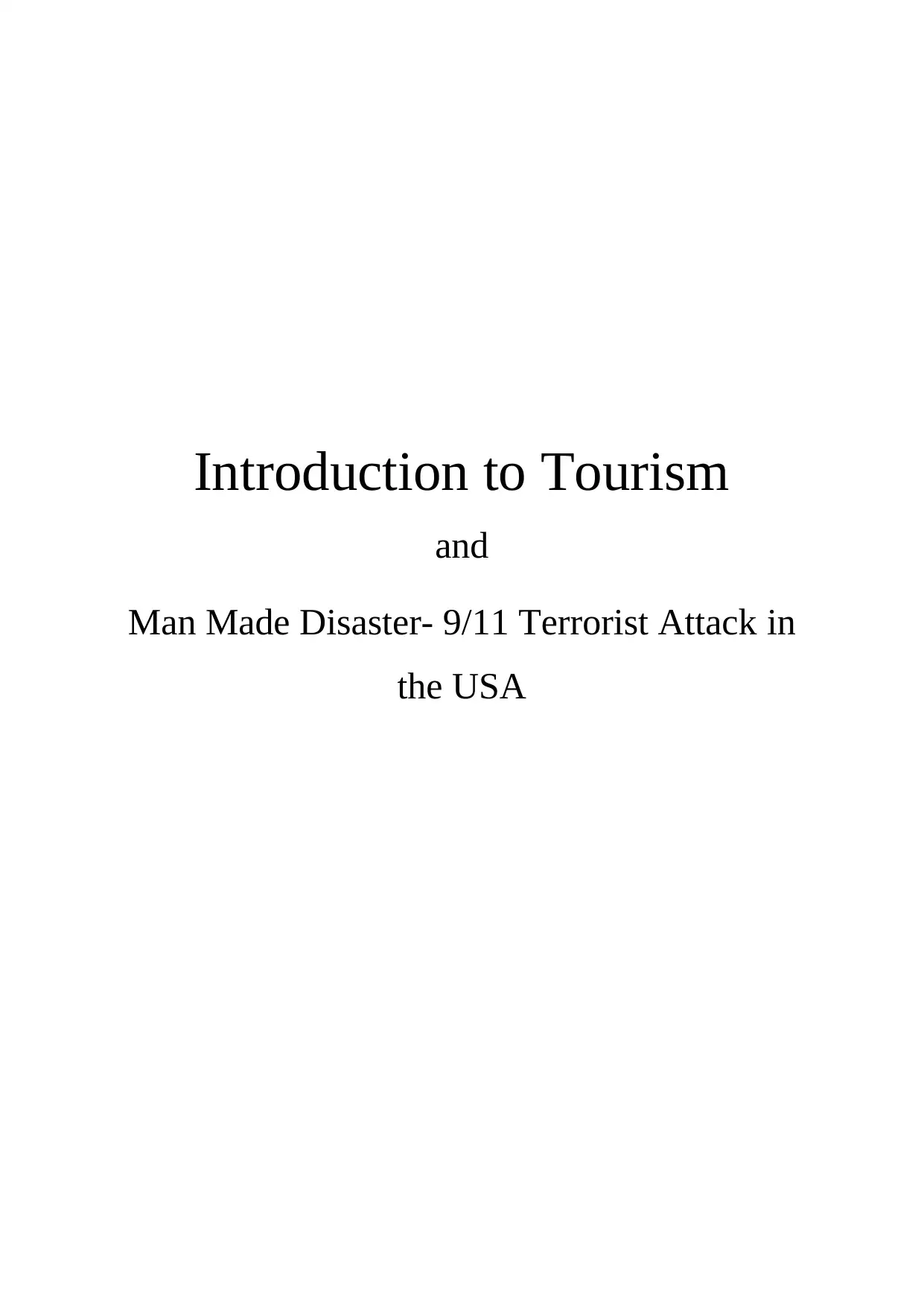
Introduction to Tourism
and
Man Made Disaster- 9/11 Terrorist Attack in
the USA
and
Man Made Disaster- 9/11 Terrorist Attack in
the USA
Paraphrase This Document
Need a fresh take? Get an instant paraphrase of this document with our AI Paraphraser
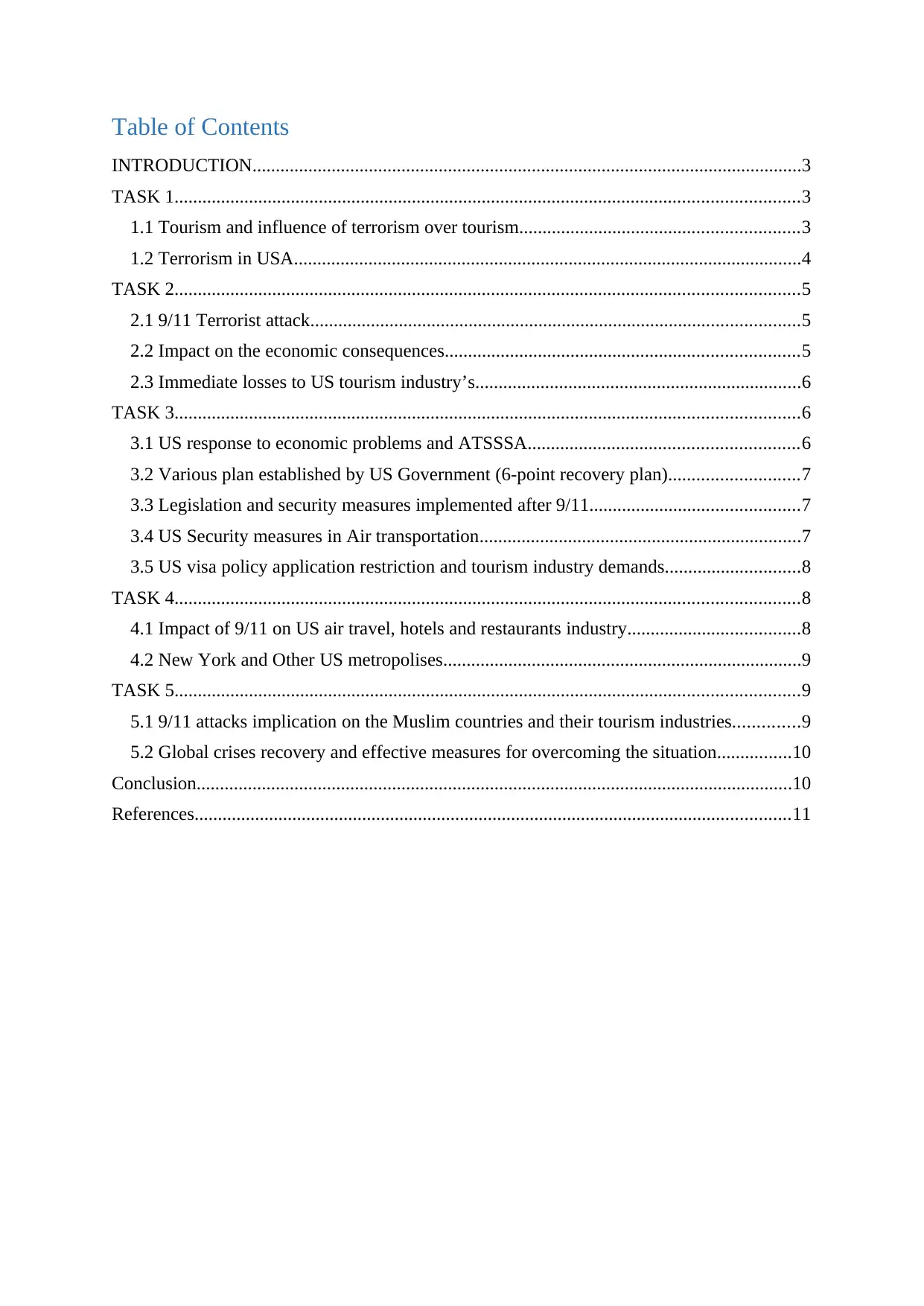
Table of Contents
INTRODUCTION......................................................................................................................3
TASK 1......................................................................................................................................3
1.1 Tourism and influence of terrorism over tourism............................................................3
1.2 Terrorism in USA.............................................................................................................4
TASK 2......................................................................................................................................5
2.1 9/11 Terrorist attack.........................................................................................................5
2.2 Impact on the economic consequences............................................................................5
2.3 Immediate losses to US tourism industry’s......................................................................6
TASK 3......................................................................................................................................6
3.1 US response to economic problems and ATSSSA..........................................................6
3.2 Various plan established by US Government (6-point recovery plan)............................7
3.3 Legislation and security measures implemented after 9/11.............................................7
3.4 US Security measures in Air transportation.....................................................................7
3.5 US visa policy application restriction and tourism industry demands.............................8
TASK 4......................................................................................................................................8
4.1 Impact of 9/11 on US air travel, hotels and restaurants industry.....................................8
4.2 New York and Other US metropolises.............................................................................9
TASK 5......................................................................................................................................9
5.1 9/11 attacks implication on the Muslim countries and their tourism industries..............9
5.2 Global crises recovery and effective measures for overcoming the situation................10
Conclusion................................................................................................................................10
References................................................................................................................................11
INTRODUCTION......................................................................................................................3
TASK 1......................................................................................................................................3
1.1 Tourism and influence of terrorism over tourism............................................................3
1.2 Terrorism in USA.............................................................................................................4
TASK 2......................................................................................................................................5
2.1 9/11 Terrorist attack.........................................................................................................5
2.2 Impact on the economic consequences............................................................................5
2.3 Immediate losses to US tourism industry’s......................................................................6
TASK 3......................................................................................................................................6
3.1 US response to economic problems and ATSSSA..........................................................6
3.2 Various plan established by US Government (6-point recovery plan)............................7
3.3 Legislation and security measures implemented after 9/11.............................................7
3.4 US Security measures in Air transportation.....................................................................7
3.5 US visa policy application restriction and tourism industry demands.............................8
TASK 4......................................................................................................................................8
4.1 Impact of 9/11 on US air travel, hotels and restaurants industry.....................................8
4.2 New York and Other US metropolises.............................................................................9
TASK 5......................................................................................................................................9
5.1 9/11 attacks implication on the Muslim countries and their tourism industries..............9
5.2 Global crises recovery and effective measures for overcoming the situation................10
Conclusion................................................................................................................................10
References................................................................................................................................11
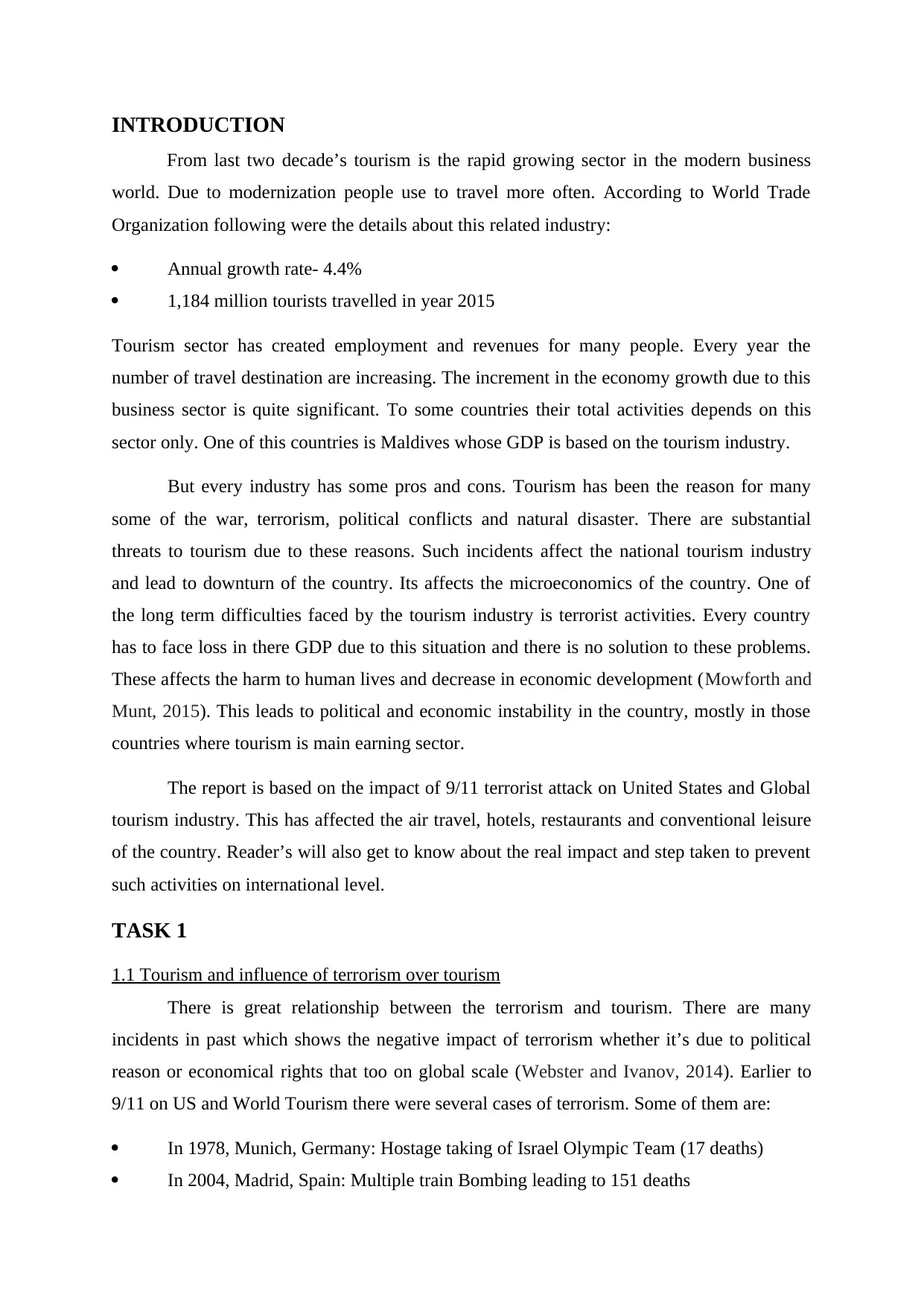
INTRODUCTION
From last two decade’s tourism is the rapid growing sector in the modern business
world. Due to modernization people use to travel more often. According to World Trade
Organization following were the details about this related industry:
Annual growth rate- 4.4%
1,184 million tourists travelled in year 2015
Tourism sector has created employment and revenues for many people. Every year the
number of travel destination are increasing. The increment in the economy growth due to this
business sector is quite significant. To some countries their total activities depends on this
sector only. One of this countries is Maldives whose GDP is based on the tourism industry.
But every industry has some pros and cons. Tourism has been the reason for many
some of the war, terrorism, political conflicts and natural disaster. There are substantial
threats to tourism due to these reasons. Such incidents affect the national tourism industry
and lead to downturn of the country. Its affects the microeconomics of the country. One of
the long term difficulties faced by the tourism industry is terrorist activities. Every country
has to face loss in there GDP due to this situation and there is no solution to these problems.
These affects the harm to human lives and decrease in economic development (Mowforth and
Munt, 2015). This leads to political and economic instability in the country, mostly in those
countries where tourism is main earning sector.
The report is based on the impact of 9/11 terrorist attack on United States and Global
tourism industry. This has affected the air travel, hotels, restaurants and conventional leisure
of the country. Reader’s will also get to know about the real impact and step taken to prevent
such activities on international level.
TASK 1
1.1 Tourism and influence of terrorism over tourism
There is great relationship between the terrorism and tourism. There are many
incidents in past which shows the negative impact of terrorism whether it’s due to political
reason or economical rights that too on global scale (Webster and Ivanov, 2014). Earlier to
9/11 on US and World Tourism there were several cases of terrorism. Some of them are:
In 1978, Munich, Germany: Hostage taking of Israel Olympic Team (17 deaths)
In 2004, Madrid, Spain: Multiple train Bombing leading to 151 deaths
From last two decade’s tourism is the rapid growing sector in the modern business
world. Due to modernization people use to travel more often. According to World Trade
Organization following were the details about this related industry:
Annual growth rate- 4.4%
1,184 million tourists travelled in year 2015
Tourism sector has created employment and revenues for many people. Every year the
number of travel destination are increasing. The increment in the economy growth due to this
business sector is quite significant. To some countries their total activities depends on this
sector only. One of this countries is Maldives whose GDP is based on the tourism industry.
But every industry has some pros and cons. Tourism has been the reason for many
some of the war, terrorism, political conflicts and natural disaster. There are substantial
threats to tourism due to these reasons. Such incidents affect the national tourism industry
and lead to downturn of the country. Its affects the microeconomics of the country. One of
the long term difficulties faced by the tourism industry is terrorist activities. Every country
has to face loss in there GDP due to this situation and there is no solution to these problems.
These affects the harm to human lives and decrease in economic development (Mowforth and
Munt, 2015). This leads to political and economic instability in the country, mostly in those
countries where tourism is main earning sector.
The report is based on the impact of 9/11 terrorist attack on United States and Global
tourism industry. This has affected the air travel, hotels, restaurants and conventional leisure
of the country. Reader’s will also get to know about the real impact and step taken to prevent
such activities on international level.
TASK 1
1.1 Tourism and influence of terrorism over tourism
There is great relationship between the terrorism and tourism. There are many
incidents in past which shows the negative impact of terrorism whether it’s due to political
reason or economical rights that too on global scale (Webster and Ivanov, 2014). Earlier to
9/11 on US and World Tourism there were several cases of terrorism. Some of them are:
In 1978, Munich, Germany: Hostage taking of Israel Olympic Team (17 deaths)
In 2004, Madrid, Spain: Multiple train Bombing leading to 151 deaths
⊘ This is a preview!⊘
Do you want full access?
Subscribe today to unlock all pages.

Trusted by 1+ million students worldwide
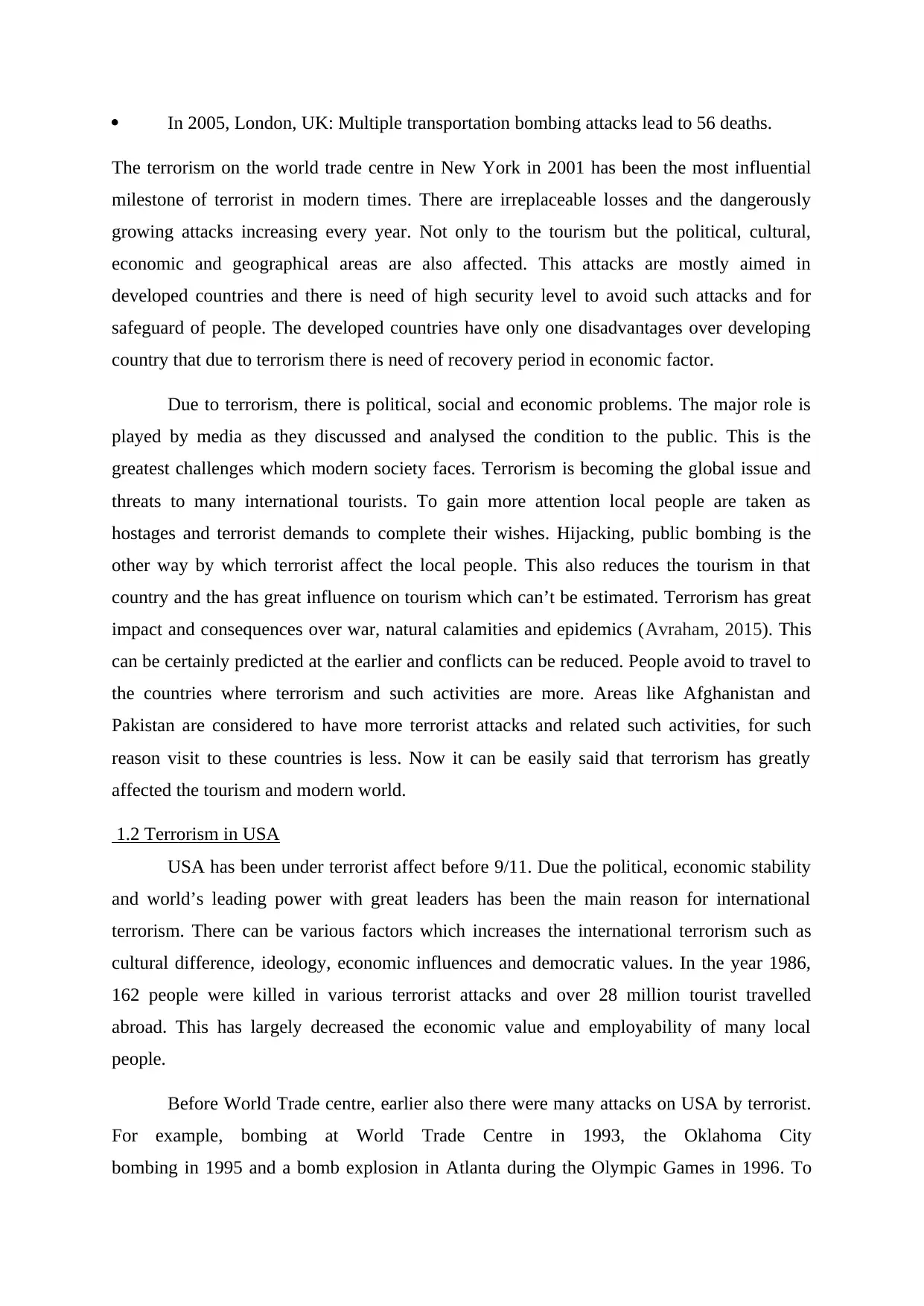
In 2005, London, UK: Multiple transportation bombing attacks lead to 56 deaths.
The terrorism on the world trade centre in New York in 2001 has been the most influential
milestone of terrorist in modern times. There are irreplaceable losses and the dangerously
growing attacks increasing every year. Not only to the tourism but the political, cultural,
economic and geographical areas are also affected. This attacks are mostly aimed in
developed countries and there is need of high security level to avoid such attacks and for
safeguard of people. The developed countries have only one disadvantages over developing
country that due to terrorism there is need of recovery period in economic factor.
Due to terrorism, there is political, social and economic problems. The major role is
played by media as they discussed and analysed the condition to the public. This is the
greatest challenges which modern society faces. Terrorism is becoming the global issue and
threats to many international tourists. To gain more attention local people are taken as
hostages and terrorist demands to complete their wishes. Hijacking, public bombing is the
other way by which terrorist affect the local people. This also reduces the tourism in that
country and the has great influence on tourism which can’t be estimated. Terrorism has great
impact and consequences over war, natural calamities and epidemics (Avraham, 2015). This
can be certainly predicted at the earlier and conflicts can be reduced. People avoid to travel to
the countries where terrorism and such activities are more. Areas like Afghanistan and
Pakistan are considered to have more terrorist attacks and related such activities, for such
reason visit to these countries is less. Now it can be easily said that terrorism has greatly
affected the tourism and modern world.
1.2 Terrorism in USA
USA has been under terrorist affect before 9/11. Due the political, economic stability
and world’s leading power with great leaders has been the main reason for international
terrorism. There can be various factors which increases the international terrorism such as
cultural difference, ideology, economic influences and democratic values. In the year 1986,
162 people were killed in various terrorist attacks and over 28 million tourist travelled
abroad. This has largely decreased the economic value and employability of many local
people.
Before World Trade centre, earlier also there were many attacks on USA by terrorist.
For example, bombing at World Trade Centre in 1993, the Oklahoma City
bombing in 1995 and a bomb explosion in Atlanta during the Olympic Games in 1996. To
The terrorism on the world trade centre in New York in 2001 has been the most influential
milestone of terrorist in modern times. There are irreplaceable losses and the dangerously
growing attacks increasing every year. Not only to the tourism but the political, cultural,
economic and geographical areas are also affected. This attacks are mostly aimed in
developed countries and there is need of high security level to avoid such attacks and for
safeguard of people. The developed countries have only one disadvantages over developing
country that due to terrorism there is need of recovery period in economic factor.
Due to terrorism, there is political, social and economic problems. The major role is
played by media as they discussed and analysed the condition to the public. This is the
greatest challenges which modern society faces. Terrorism is becoming the global issue and
threats to many international tourists. To gain more attention local people are taken as
hostages and terrorist demands to complete their wishes. Hijacking, public bombing is the
other way by which terrorist affect the local people. This also reduces the tourism in that
country and the has great influence on tourism which can’t be estimated. Terrorism has great
impact and consequences over war, natural calamities and epidemics (Avraham, 2015). This
can be certainly predicted at the earlier and conflicts can be reduced. People avoid to travel to
the countries where terrorism and such activities are more. Areas like Afghanistan and
Pakistan are considered to have more terrorist attacks and related such activities, for such
reason visit to these countries is less. Now it can be easily said that terrorism has greatly
affected the tourism and modern world.
1.2 Terrorism in USA
USA has been under terrorist affect before 9/11. Due the political, economic stability
and world’s leading power with great leaders has been the main reason for international
terrorism. There can be various factors which increases the international terrorism such as
cultural difference, ideology, economic influences and democratic values. In the year 1986,
162 people were killed in various terrorist attacks and over 28 million tourist travelled
abroad. This has largely decreased the economic value and employability of many local
people.
Before World Trade centre, earlier also there were many attacks on USA by terrorist.
For example, bombing at World Trade Centre in 1993, the Oklahoma City
bombing in 1995 and a bomb explosion in Atlanta during the Olympic Games in 1996. To
Paraphrase This Document
Need a fresh take? Get an instant paraphrase of this document with our AI Paraphraser
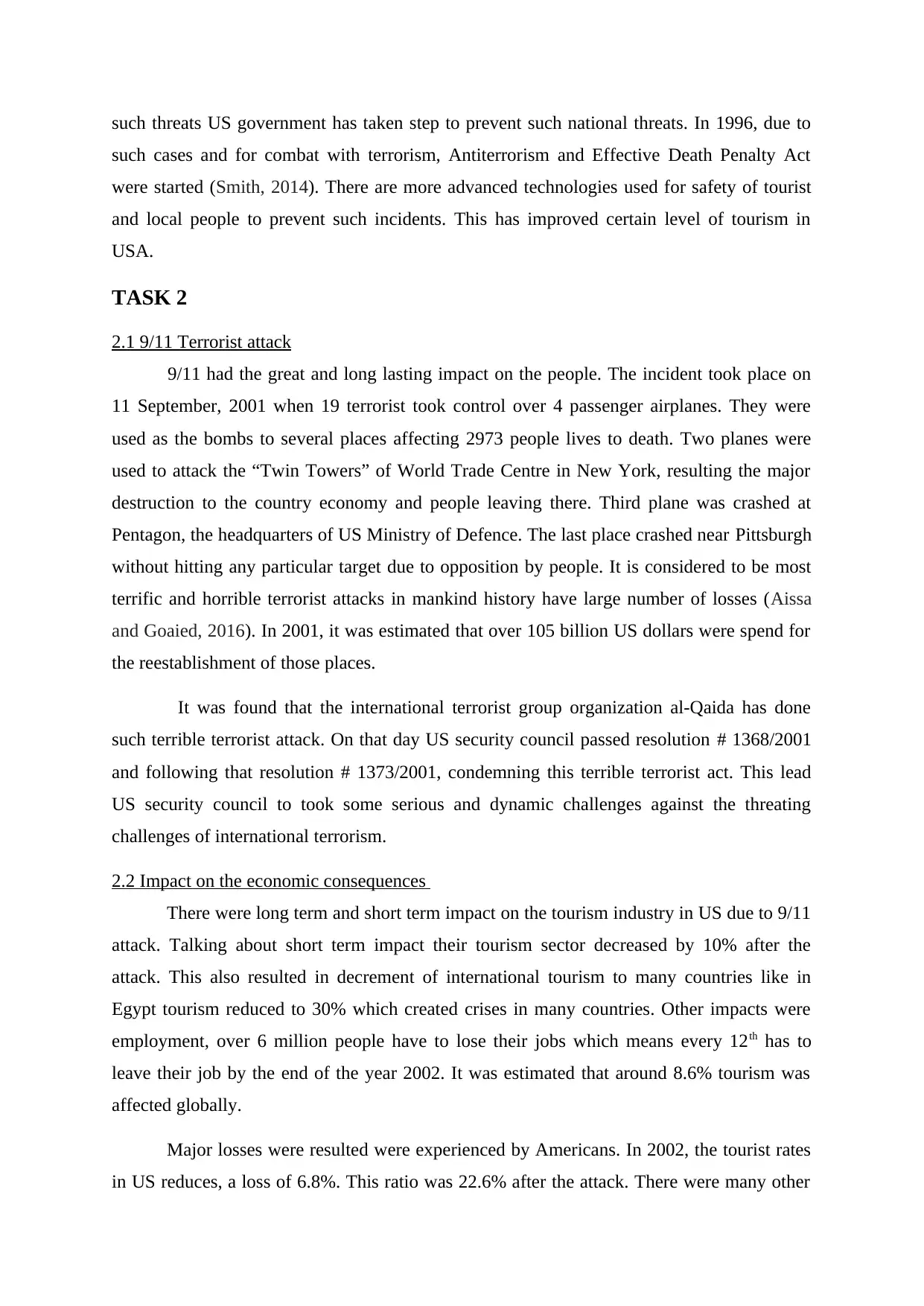
such threats US government has taken step to prevent such national threats. In 1996, due to
such cases and for combat with terrorism, Antiterrorism and Effective Death Penalty Act
were started (Smith, 2014). There are more advanced technologies used for safety of tourist
and local people to prevent such incidents. This has improved certain level of tourism in
USA.
TASK 2
2.1 9/11 Terrorist attack
9/11 had the great and long lasting impact on the people. The incident took place on
11 September, 2001 when 19 terrorist took control over 4 passenger airplanes. They were
used as the bombs to several places affecting 2973 people lives to death. Two planes were
used to attack the “Twin Towers” of World Trade Centre in New York, resulting the major
destruction to the country economy and people leaving there. Third plane was crashed at
Pentagon, the headquarters of US Ministry of Defence. The last place crashed near Pittsburgh
without hitting any particular target due to opposition by people. It is considered to be most
terrific and horrible terrorist attacks in mankind history have large number of losses (Aissa
and Goaied, 2016). In 2001, it was estimated that over 105 billion US dollars were spend for
the reestablishment of those places.
It was found that the international terrorist group organization al-Qaida has done
such terrible terrorist attack. On that day US security council passed resolution # 1368/2001
and following that resolution # 1373/2001, condemning this terrible terrorist act. This lead
US security council to took some serious and dynamic challenges against the threating
challenges of international terrorism.
2.2 Impact on the economic consequences
There were long term and short term impact on the tourism industry in US due to 9/11
attack. Talking about short term impact their tourism sector decreased by 10% after the
attack. This also resulted in decrement of international tourism to many countries like in
Egypt tourism reduced to 30% which created crises in many countries. Other impacts were
employment, over 6 million people have to lose their jobs which means every 12th has to
leave their job by the end of the year 2002. It was estimated that around 8.6% tourism was
affected globally.
Major losses were resulted were experienced by Americans. In 2002, the tourist rates
in US reduces, a loss of 6.8%. This ratio was 22.6% after the attack. There were many other
such cases and for combat with terrorism, Antiterrorism and Effective Death Penalty Act
were started (Smith, 2014). There are more advanced technologies used for safety of tourist
and local people to prevent such incidents. This has improved certain level of tourism in
USA.
TASK 2
2.1 9/11 Terrorist attack
9/11 had the great and long lasting impact on the people. The incident took place on
11 September, 2001 when 19 terrorist took control over 4 passenger airplanes. They were
used as the bombs to several places affecting 2973 people lives to death. Two planes were
used to attack the “Twin Towers” of World Trade Centre in New York, resulting the major
destruction to the country economy and people leaving there. Third plane was crashed at
Pentagon, the headquarters of US Ministry of Defence. The last place crashed near Pittsburgh
without hitting any particular target due to opposition by people. It is considered to be most
terrific and horrible terrorist attacks in mankind history have large number of losses (Aissa
and Goaied, 2016). In 2001, it was estimated that over 105 billion US dollars were spend for
the reestablishment of those places.
It was found that the international terrorist group organization al-Qaida has done
such terrible terrorist attack. On that day US security council passed resolution # 1368/2001
and following that resolution # 1373/2001, condemning this terrible terrorist act. This lead
US security council to took some serious and dynamic challenges against the threating
challenges of international terrorism.
2.2 Impact on the economic consequences
There were long term and short term impact on the tourism industry in US due to 9/11
attack. Talking about short term impact their tourism sector decreased by 10% after the
attack. This also resulted in decrement of international tourism to many countries like in
Egypt tourism reduced to 30% which created crises in many countries. Other impacts were
employment, over 6 million people have to lose their jobs which means every 12th has to
leave their job by the end of the year 2002. It was estimated that around 8.6% tourism was
affected globally.
Major losses were resulted were experienced by Americans. In 2002, the tourist rates
in US reduces, a loss of 6.8%. This ratio was 22.6% after the attack. There were many other
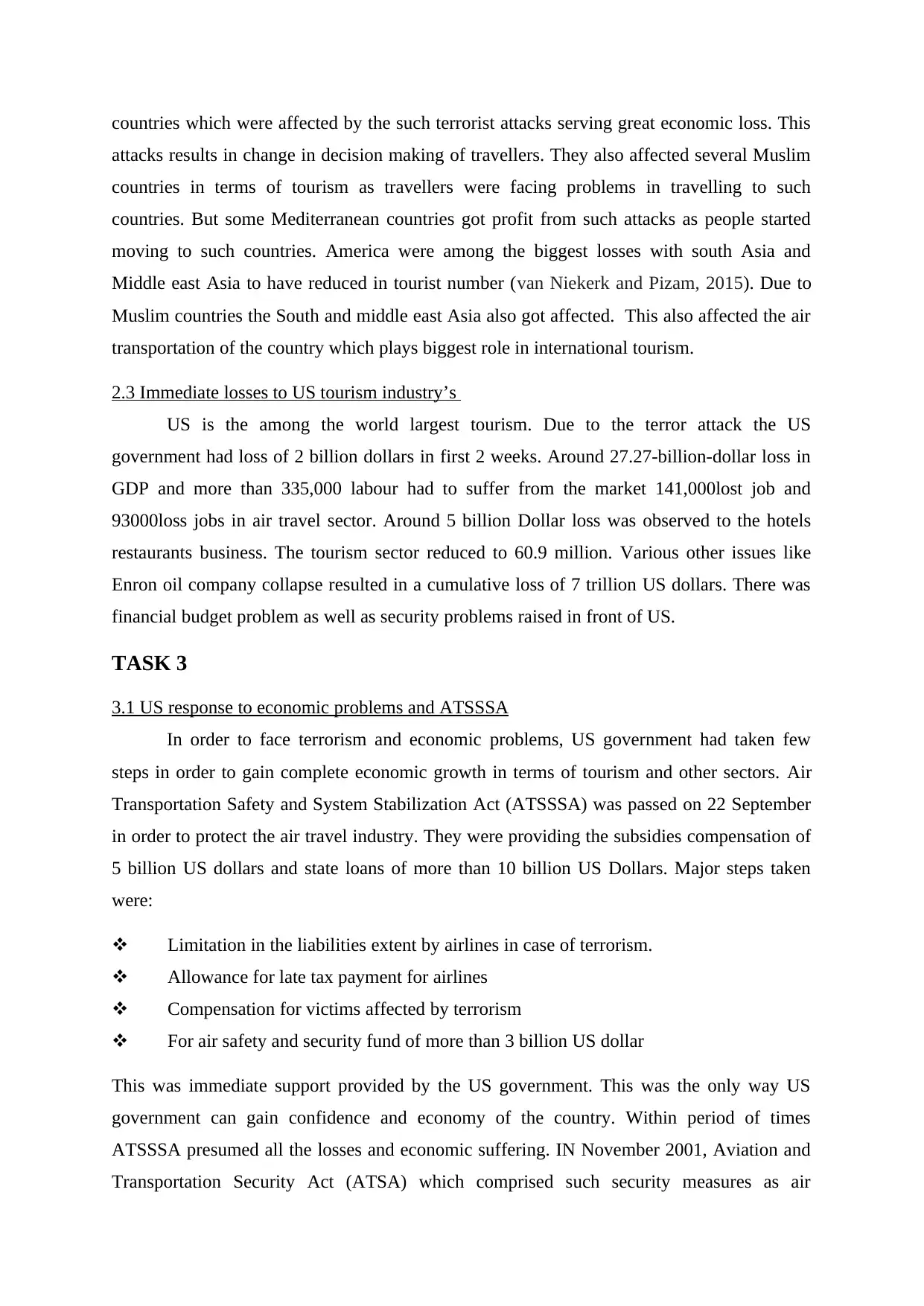
countries which were affected by the such terrorist attacks serving great economic loss. This
attacks results in change in decision making of travellers. They also affected several Muslim
countries in terms of tourism as travellers were facing problems in travelling to such
countries. But some Mediterranean countries got profit from such attacks as people started
moving to such countries. America were among the biggest losses with south Asia and
Middle east Asia to have reduced in tourist number (van Niekerk and Pizam, 2015). Due to
Muslim countries the South and middle east Asia also got affected. This also affected the air
transportation of the country which plays biggest role in international tourism.
2.3 Immediate losses to US tourism industry’s
US is the among the world largest tourism. Due to the terror attack the US
government had loss of 2 billion dollars in first 2 weeks. Around 27.27-billion-dollar loss in
GDP and more than 335,000 labour had to suffer from the market 141,000lost job and
93000loss jobs in air travel sector. Around 5 billion Dollar loss was observed to the hotels
restaurants business. The tourism sector reduced to 60.9 million. Various other issues like
Enron oil company collapse resulted in a cumulative loss of 7 trillion US dollars. There was
financial budget problem as well as security problems raised in front of US.
TASK 3
3.1 US response to economic problems and ATSSSA
In order to face terrorism and economic problems, US government had taken few
steps in order to gain complete economic growth in terms of tourism and other sectors. Air
Transportation Safety and System Stabilization Act (ATSSSA) was passed on 22 September
in order to protect the air travel industry. They were providing the subsidies compensation of
5 billion US dollars and state loans of more than 10 billion US Dollars. Major steps taken
were:
Limitation in the liabilities extent by airlines in case of terrorism.
Allowance for late tax payment for airlines
Compensation for victims affected by terrorism
For air safety and security fund of more than 3 billion US dollar
This was immediate support provided by the US government. This was the only way US
government can gain confidence and economy of the country. Within period of times
ATSSSA presumed all the losses and economic suffering. IN November 2001, Aviation and
Transportation Security Act (ATSA) which comprised such security measures as air
attacks results in change in decision making of travellers. They also affected several Muslim
countries in terms of tourism as travellers were facing problems in travelling to such
countries. But some Mediterranean countries got profit from such attacks as people started
moving to such countries. America were among the biggest losses with south Asia and
Middle east Asia to have reduced in tourist number (van Niekerk and Pizam, 2015). Due to
Muslim countries the South and middle east Asia also got affected. This also affected the air
transportation of the country which plays biggest role in international tourism.
2.3 Immediate losses to US tourism industry’s
US is the among the world largest tourism. Due to the terror attack the US
government had loss of 2 billion dollars in first 2 weeks. Around 27.27-billion-dollar loss in
GDP and more than 335,000 labour had to suffer from the market 141,000lost job and
93000loss jobs in air travel sector. Around 5 billion Dollar loss was observed to the hotels
restaurants business. The tourism sector reduced to 60.9 million. Various other issues like
Enron oil company collapse resulted in a cumulative loss of 7 trillion US dollars. There was
financial budget problem as well as security problems raised in front of US.
TASK 3
3.1 US response to economic problems and ATSSSA
In order to face terrorism and economic problems, US government had taken few
steps in order to gain complete economic growth in terms of tourism and other sectors. Air
Transportation Safety and System Stabilization Act (ATSSSA) was passed on 22 September
in order to protect the air travel industry. They were providing the subsidies compensation of
5 billion US dollars and state loans of more than 10 billion US Dollars. Major steps taken
were:
Limitation in the liabilities extent by airlines in case of terrorism.
Allowance for late tax payment for airlines
Compensation for victims affected by terrorism
For air safety and security fund of more than 3 billion US dollar
This was immediate support provided by the US government. This was the only way US
government can gain confidence and economy of the country. Within period of times
ATSSSA presumed all the losses and economic suffering. IN November 2001, Aviation and
Transportation Security Act (ATSA) which comprised such security measures as air
⊘ This is a preview!⊘
Do you want full access?
Subscribe today to unlock all pages.

Trusted by 1+ million students worldwide
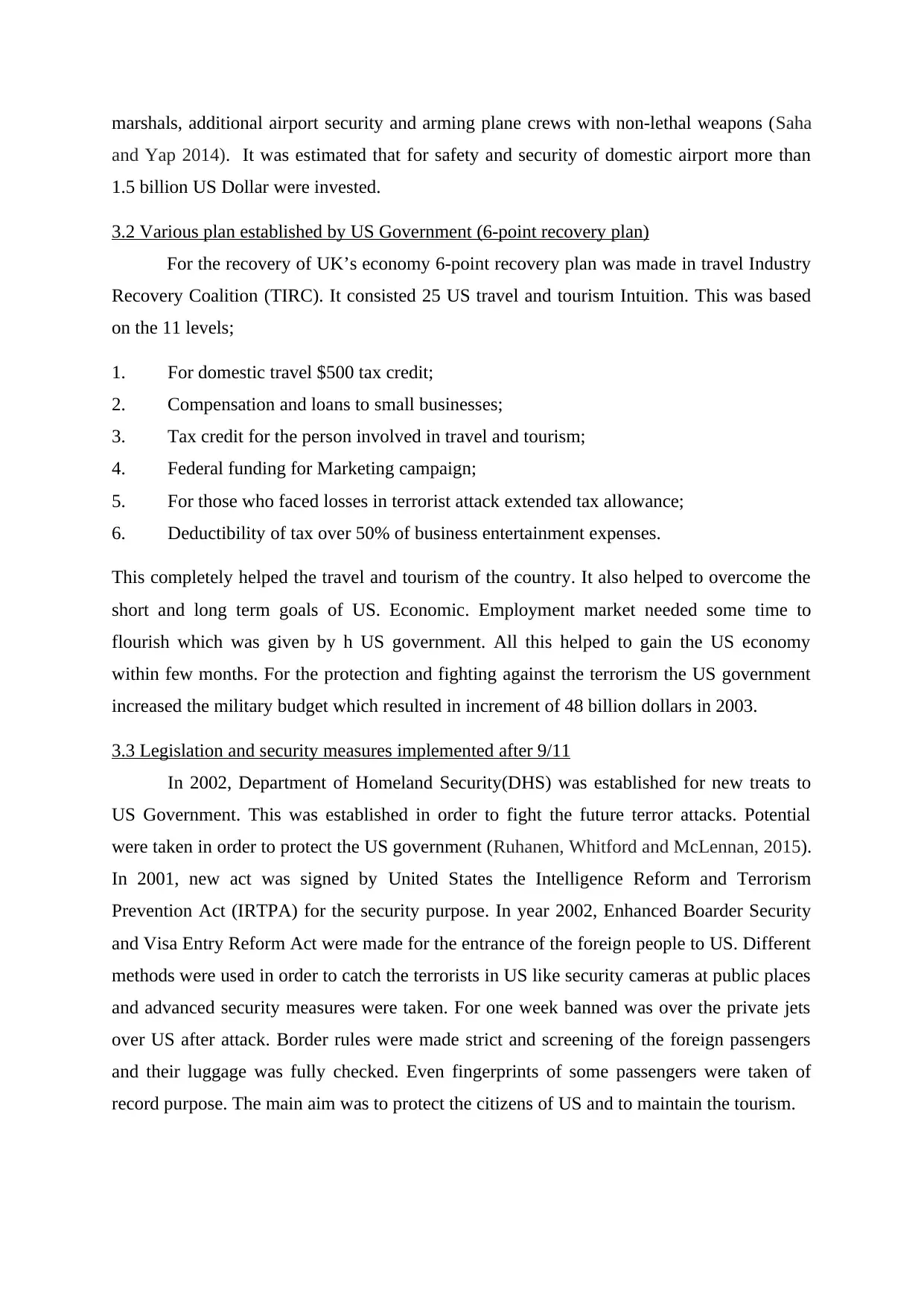
marshals, additional airport security and arming plane crews with non-lethal weapons (Saha
and Yap 2014). It was estimated that for safety and security of domestic airport more than
1.5 billion US Dollar were invested.
3.2 Various plan established by US Government (6-point recovery plan)
For the recovery of UK’s economy 6-point recovery plan was made in travel Industry
Recovery Coalition (TIRC). It consisted 25 US travel and tourism Intuition. This was based
on the 11 levels;
1. For domestic travel $500 tax credit;
2. Compensation and loans to small businesses;
3. Tax credit for the person involved in travel and tourism;
4. Federal funding for Marketing campaign;
5. For those who faced losses in terrorist attack extended tax allowance;
6. Deductibility of tax over 50% of business entertainment expenses.
This completely helped the travel and tourism of the country. It also helped to overcome the
short and long term goals of US. Economic. Employment market needed some time to
flourish which was given by h US government. All this helped to gain the US economy
within few months. For the protection and fighting against the terrorism the US government
increased the military budget which resulted in increment of 48 billion dollars in 2003.
3.3 Legislation and security measures implemented after 9/11
In 2002, Department of Homeland Security(DHS) was established for new treats to
US Government. This was established in order to fight the future terror attacks. Potential
were taken in order to protect the US government (Ruhanen, Whitford and McLennan, 2015).
In 2001, new act was signed by United States the Intelligence Reform and Terrorism
Prevention Act (IRTPA) for the security purpose. In year 2002, Enhanced Boarder Security
and Visa Entry Reform Act were made for the entrance of the foreign people to US. Different
methods were used in order to catch the terrorists in US like security cameras at public places
and advanced security measures were taken. For one week banned was over the private jets
over US after attack. Border rules were made strict and screening of the foreign passengers
and their luggage was fully checked. Even fingerprints of some passengers were taken of
record purpose. The main aim was to protect the citizens of US and to maintain the tourism.
and Yap 2014). It was estimated that for safety and security of domestic airport more than
1.5 billion US Dollar were invested.
3.2 Various plan established by US Government (6-point recovery plan)
For the recovery of UK’s economy 6-point recovery plan was made in travel Industry
Recovery Coalition (TIRC). It consisted 25 US travel and tourism Intuition. This was based
on the 11 levels;
1. For domestic travel $500 tax credit;
2. Compensation and loans to small businesses;
3. Tax credit for the person involved in travel and tourism;
4. Federal funding for Marketing campaign;
5. For those who faced losses in terrorist attack extended tax allowance;
6. Deductibility of tax over 50% of business entertainment expenses.
This completely helped the travel and tourism of the country. It also helped to overcome the
short and long term goals of US. Economic. Employment market needed some time to
flourish which was given by h US government. All this helped to gain the US economy
within few months. For the protection and fighting against the terrorism the US government
increased the military budget which resulted in increment of 48 billion dollars in 2003.
3.3 Legislation and security measures implemented after 9/11
In 2002, Department of Homeland Security(DHS) was established for new treats to
US Government. This was established in order to fight the future terror attacks. Potential
were taken in order to protect the US government (Ruhanen, Whitford and McLennan, 2015).
In 2001, new act was signed by United States the Intelligence Reform and Terrorism
Prevention Act (IRTPA) for the security purpose. In year 2002, Enhanced Boarder Security
and Visa Entry Reform Act were made for the entrance of the foreign people to US. Different
methods were used in order to catch the terrorists in US like security cameras at public places
and advanced security measures were taken. For one week banned was over the private jets
over US after attack. Border rules were made strict and screening of the foreign passengers
and their luggage was fully checked. Even fingerprints of some passengers were taken of
record purpose. The main aim was to protect the citizens of US and to maintain the tourism.
Paraphrase This Document
Need a fresh take? Get an instant paraphrase of this document with our AI Paraphraser
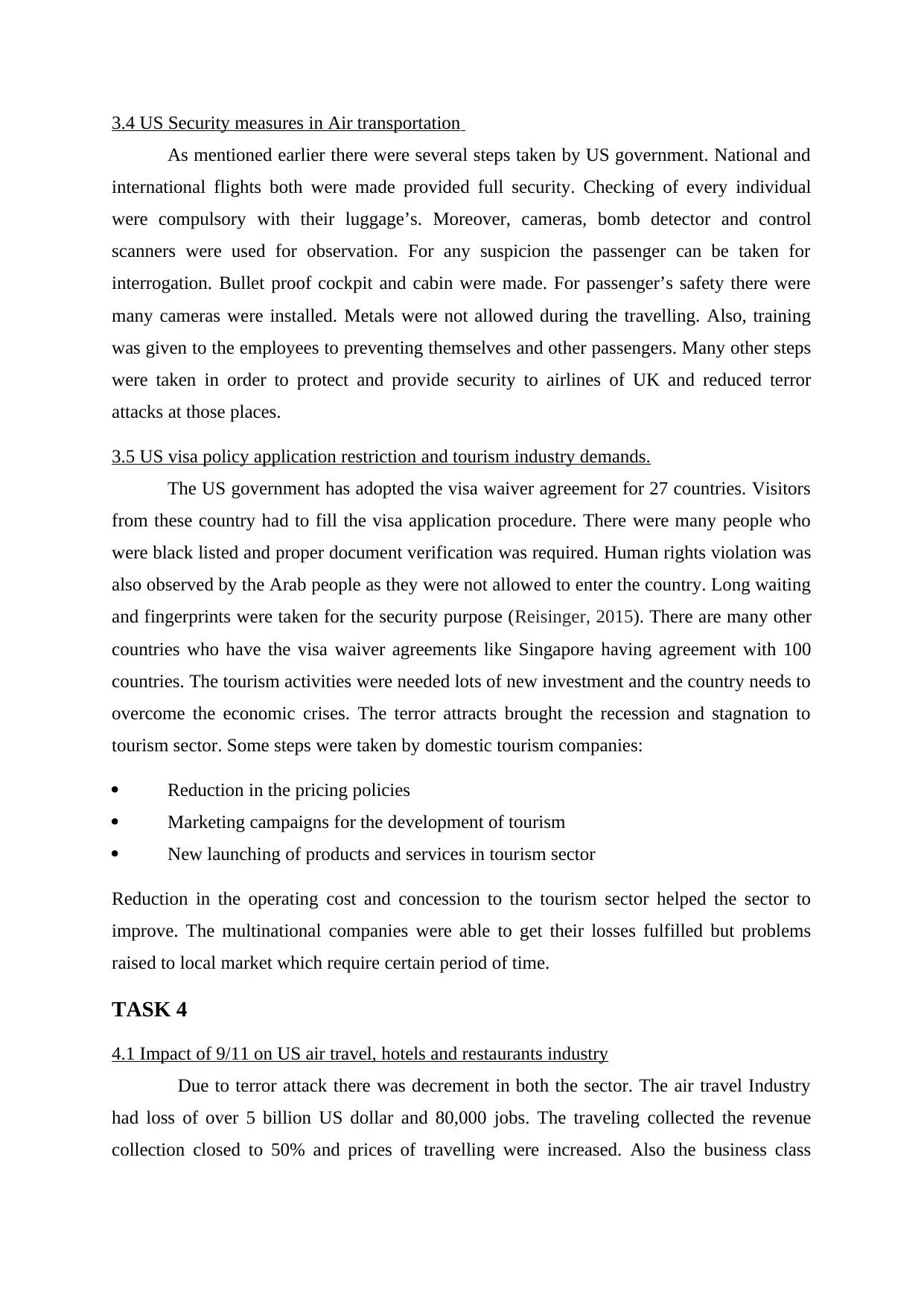
3.4 US Security measures in Air transportation
As mentioned earlier there were several steps taken by US government. National and
international flights both were made provided full security. Checking of every individual
were compulsory with their luggage’s. Moreover, cameras, bomb detector and control
scanners were used for observation. For any suspicion the passenger can be taken for
interrogation. Bullet proof cockpit and cabin were made. For passenger’s safety there were
many cameras were installed. Metals were not allowed during the travelling. Also, training
was given to the employees to preventing themselves and other passengers. Many other steps
were taken in order to protect and provide security to airlines of UK and reduced terror
attacks at those places.
3.5 US visa policy application restriction and tourism industry demands.
The US government has adopted the visa waiver agreement for 27 countries. Visitors
from these country had to fill the visa application procedure. There were many people who
were black listed and proper document verification was required. Human rights violation was
also observed by the Arab people as they were not allowed to enter the country. Long waiting
and fingerprints were taken for the security purpose (Reisinger, 2015). There are many other
countries who have the visa waiver agreements like Singapore having agreement with 100
countries. The tourism activities were needed lots of new investment and the country needs to
overcome the economic crises. The terror attracts brought the recession and stagnation to
tourism sector. Some steps were taken by domestic tourism companies:
Reduction in the pricing policies
Marketing campaigns for the development of tourism
New launching of products and services in tourism sector
Reduction in the operating cost and concession to the tourism sector helped the sector to
improve. The multinational companies were able to get their losses fulfilled but problems
raised to local market which require certain period of time.
TASK 4
4.1 Impact of 9/11 on US air travel, hotels and restaurants industry
Due to terror attack there was decrement in both the sector. The air travel Industry
had loss of over 5 billion US dollar and 80,000 jobs. The traveling collected the revenue
collection closed to 50% and prices of travelling were increased. Also the business class
As mentioned earlier there were several steps taken by US government. National and
international flights both were made provided full security. Checking of every individual
were compulsory with their luggage’s. Moreover, cameras, bomb detector and control
scanners were used for observation. For any suspicion the passenger can be taken for
interrogation. Bullet proof cockpit and cabin were made. For passenger’s safety there were
many cameras were installed. Metals were not allowed during the travelling. Also, training
was given to the employees to preventing themselves and other passengers. Many other steps
were taken in order to protect and provide security to airlines of UK and reduced terror
attacks at those places.
3.5 US visa policy application restriction and tourism industry demands.
The US government has adopted the visa waiver agreement for 27 countries. Visitors
from these country had to fill the visa application procedure. There were many people who
were black listed and proper document verification was required. Human rights violation was
also observed by the Arab people as they were not allowed to enter the country. Long waiting
and fingerprints were taken for the security purpose (Reisinger, 2015). There are many other
countries who have the visa waiver agreements like Singapore having agreement with 100
countries. The tourism activities were needed lots of new investment and the country needs to
overcome the economic crises. The terror attracts brought the recession and stagnation to
tourism sector. Some steps were taken by domestic tourism companies:
Reduction in the pricing policies
Marketing campaigns for the development of tourism
New launching of products and services in tourism sector
Reduction in the operating cost and concession to the tourism sector helped the sector to
improve. The multinational companies were able to get their losses fulfilled but problems
raised to local market which require certain period of time.
TASK 4
4.1 Impact of 9/11 on US air travel, hotels and restaurants industry
Due to terror attack there was decrement in both the sector. The air travel Industry
had loss of over 5 billion US dollar and 80,000 jobs. The traveling collected the revenue
collection closed to 50% and prices of travelling were increased. Also the business class
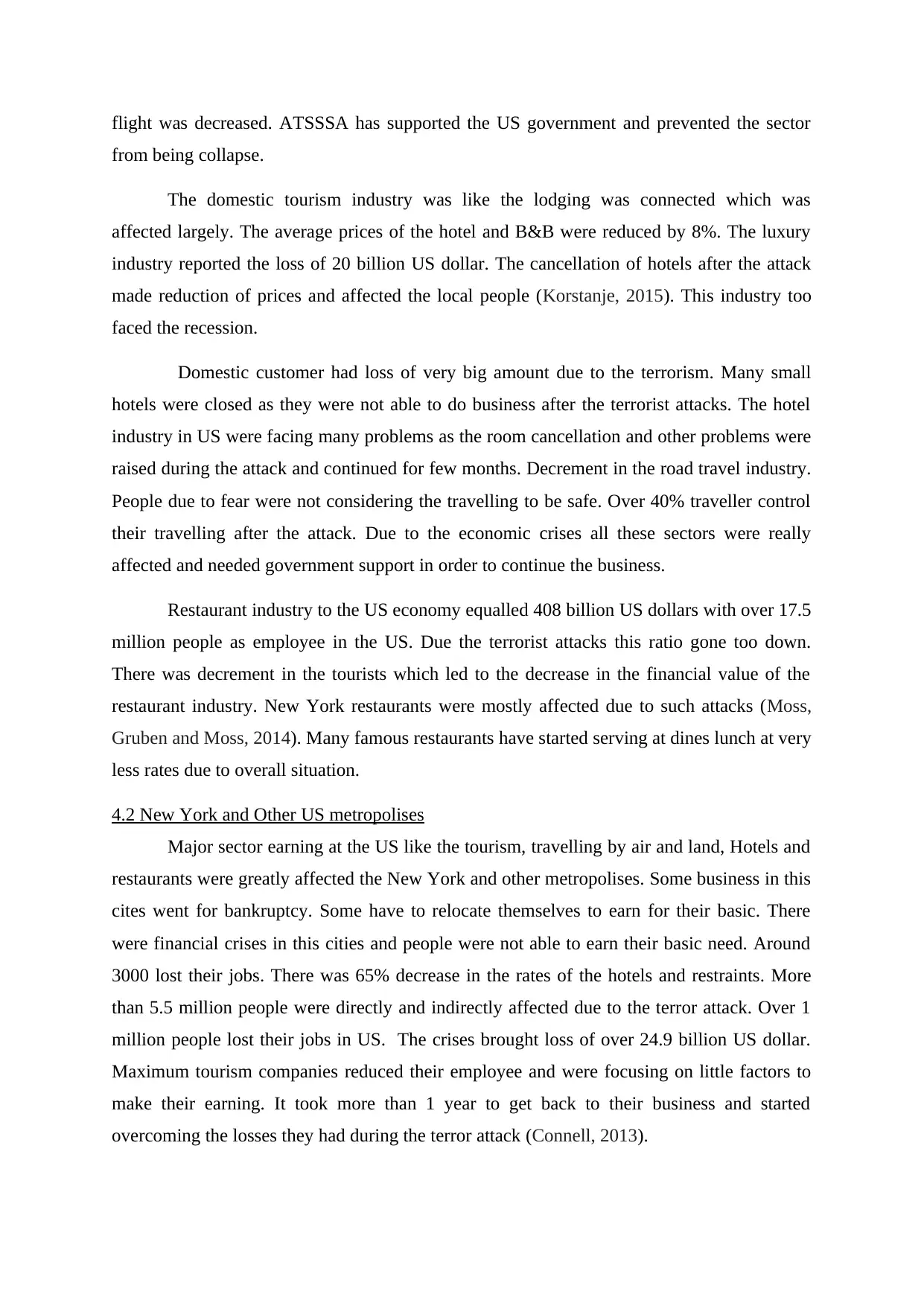
flight was decreased. ATSSSA has supported the US government and prevented the sector
from being collapse.
The domestic tourism industry was like the lodging was connected which was
affected largely. The average prices of the hotel and B&B were reduced by 8%. The luxury
industry reported the loss of 20 billion US dollar. The cancellation of hotels after the attack
made reduction of prices and affected the local people (Korstanje, 2015). This industry too
faced the recession.
Domestic customer had loss of very big amount due to the terrorism. Many small
hotels were closed as they were not able to do business after the terrorist attacks. The hotel
industry in US were facing many problems as the room cancellation and other problems were
raised during the attack and continued for few months. Decrement in the road travel industry.
People due to fear were not considering the travelling to be safe. Over 40% traveller control
their travelling after the attack. Due to the economic crises all these sectors were really
affected and needed government support in order to continue the business.
Restaurant industry to the US economy equalled 408 billion US dollars with over 17.5
million people as employee in the US. Due the terrorist attacks this ratio gone too down.
There was decrement in the tourists which led to the decrease in the financial value of the
restaurant industry. New York restaurants were mostly affected due to such attacks (Moss,
Gruben and Moss, 2014). Many famous restaurants have started serving at dines lunch at very
less rates due to overall situation.
4.2 New York and Other US metropolises
Major sector earning at the US like the tourism, travelling by air and land, Hotels and
restaurants were greatly affected the New York and other metropolises. Some business in this
cites went for bankruptcy. Some have to relocate themselves to earn for their basic. There
were financial crises in this cities and people were not able to earn their basic need. Around
3000 lost their jobs. There was 65% decrease in the rates of the hotels and restraints. More
than 5.5 million people were directly and indirectly affected due to the terror attack. Over 1
million people lost their jobs in US. The crises brought loss of over 24.9 billion US dollar.
Maximum tourism companies reduced their employee and were focusing on little factors to
make their earning. It took more than 1 year to get back to their business and started
overcoming the losses they had during the terror attack (Connell, 2013).
from being collapse.
The domestic tourism industry was like the lodging was connected which was
affected largely. The average prices of the hotel and B&B were reduced by 8%. The luxury
industry reported the loss of 20 billion US dollar. The cancellation of hotels after the attack
made reduction of prices and affected the local people (Korstanje, 2015). This industry too
faced the recession.
Domestic customer had loss of very big amount due to the terrorism. Many small
hotels were closed as they were not able to do business after the terrorist attacks. The hotel
industry in US were facing many problems as the room cancellation and other problems were
raised during the attack and continued for few months. Decrement in the road travel industry.
People due to fear were not considering the travelling to be safe. Over 40% traveller control
their travelling after the attack. Due to the economic crises all these sectors were really
affected and needed government support in order to continue the business.
Restaurant industry to the US economy equalled 408 billion US dollars with over 17.5
million people as employee in the US. Due the terrorist attacks this ratio gone too down.
There was decrement in the tourists which led to the decrease in the financial value of the
restaurant industry. New York restaurants were mostly affected due to such attacks (Moss,
Gruben and Moss, 2014). Many famous restaurants have started serving at dines lunch at very
less rates due to overall situation.
4.2 New York and Other US metropolises
Major sector earning at the US like the tourism, travelling by air and land, Hotels and
restaurants were greatly affected the New York and other metropolises. Some business in this
cites went for bankruptcy. Some have to relocate themselves to earn for their basic. There
were financial crises in this cities and people were not able to earn their basic need. Around
3000 lost their jobs. There was 65% decrease in the rates of the hotels and restraints. More
than 5.5 million people were directly and indirectly affected due to the terror attack. Over 1
million people lost their jobs in US. The crises brought loss of over 24.9 billion US dollar.
Maximum tourism companies reduced their employee and were focusing on little factors to
make their earning. It took more than 1 year to get back to their business and started
overcoming the losses they had during the terror attack (Connell, 2013).
⊘ This is a preview!⊘
Do you want full access?
Subscribe today to unlock all pages.

Trusted by 1+ million students worldwide
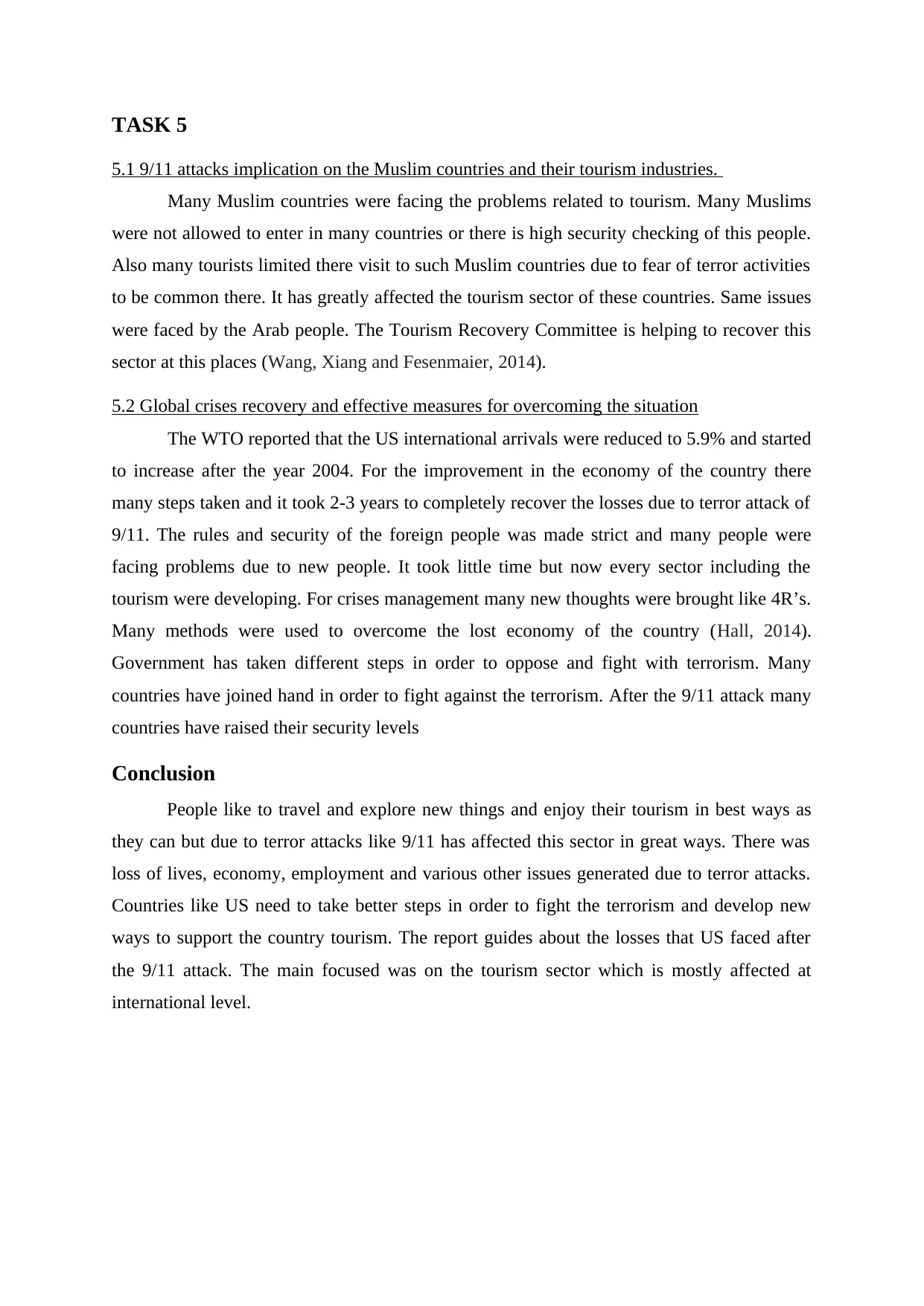
TASK 5
5.1 9/11 attacks implication on the Muslim countries and their tourism industries.
Many Muslim countries were facing the problems related to tourism. Many Muslims
were not allowed to enter in many countries or there is high security checking of this people.
Also many tourists limited there visit to such Muslim countries due to fear of terror activities
to be common there. It has greatly affected the tourism sector of these countries. Same issues
were faced by the Arab people. The Tourism Recovery Committee is helping to recover this
sector at this places (Wang, Xiang and Fesenmaier, 2014).
5.2 Global crises recovery and effective measures for overcoming the situation
The WTO reported that the US international arrivals were reduced to 5.9% and started
to increase after the year 2004. For the improvement in the economy of the country there
many steps taken and it took 2-3 years to completely recover the losses due to terror attack of
9/11. The rules and security of the foreign people was made strict and many people were
facing problems due to new people. It took little time but now every sector including the
tourism were developing. For crises management many new thoughts were brought like 4R’s.
Many methods were used to overcome the lost economy of the country (Hall, 2014).
Government has taken different steps in order to oppose and fight with terrorism. Many
countries have joined hand in order to fight against the terrorism. After the 9/11 attack many
countries have raised their security levels
Conclusion
People like to travel and explore new things and enjoy their tourism in best ways as
they can but due to terror attacks like 9/11 has affected this sector in great ways. There was
loss of lives, economy, employment and various other issues generated due to terror attacks.
Countries like US need to take better steps in order to fight the terrorism and develop new
ways to support the country tourism. The report guides about the losses that US faced after
the 9/11 attack. The main focused was on the tourism sector which is mostly affected at
international level.
5.1 9/11 attacks implication on the Muslim countries and their tourism industries.
Many Muslim countries were facing the problems related to tourism. Many Muslims
were not allowed to enter in many countries or there is high security checking of this people.
Also many tourists limited there visit to such Muslim countries due to fear of terror activities
to be common there. It has greatly affected the tourism sector of these countries. Same issues
were faced by the Arab people. The Tourism Recovery Committee is helping to recover this
sector at this places (Wang, Xiang and Fesenmaier, 2014).
5.2 Global crises recovery and effective measures for overcoming the situation
The WTO reported that the US international arrivals were reduced to 5.9% and started
to increase after the year 2004. For the improvement in the economy of the country there
many steps taken and it took 2-3 years to completely recover the losses due to terror attack of
9/11. The rules and security of the foreign people was made strict and many people were
facing problems due to new people. It took little time but now every sector including the
tourism were developing. For crises management many new thoughts were brought like 4R’s.
Many methods were used to overcome the lost economy of the country (Hall, 2014).
Government has taken different steps in order to oppose and fight with terrorism. Many
countries have joined hand in order to fight against the terrorism. After the 9/11 attack many
countries have raised their security levels
Conclusion
People like to travel and explore new things and enjoy their tourism in best ways as
they can but due to terror attacks like 9/11 has affected this sector in great ways. There was
loss of lives, economy, employment and various other issues generated due to terror attacks.
Countries like US need to take better steps in order to fight the terrorism and develop new
ways to support the country tourism. The report guides about the losses that US faced after
the 9/11 attack. The main focused was on the tourism sector which is mostly affected at
international level.
Paraphrase This Document
Need a fresh take? Get an instant paraphrase of this document with our AI Paraphraser
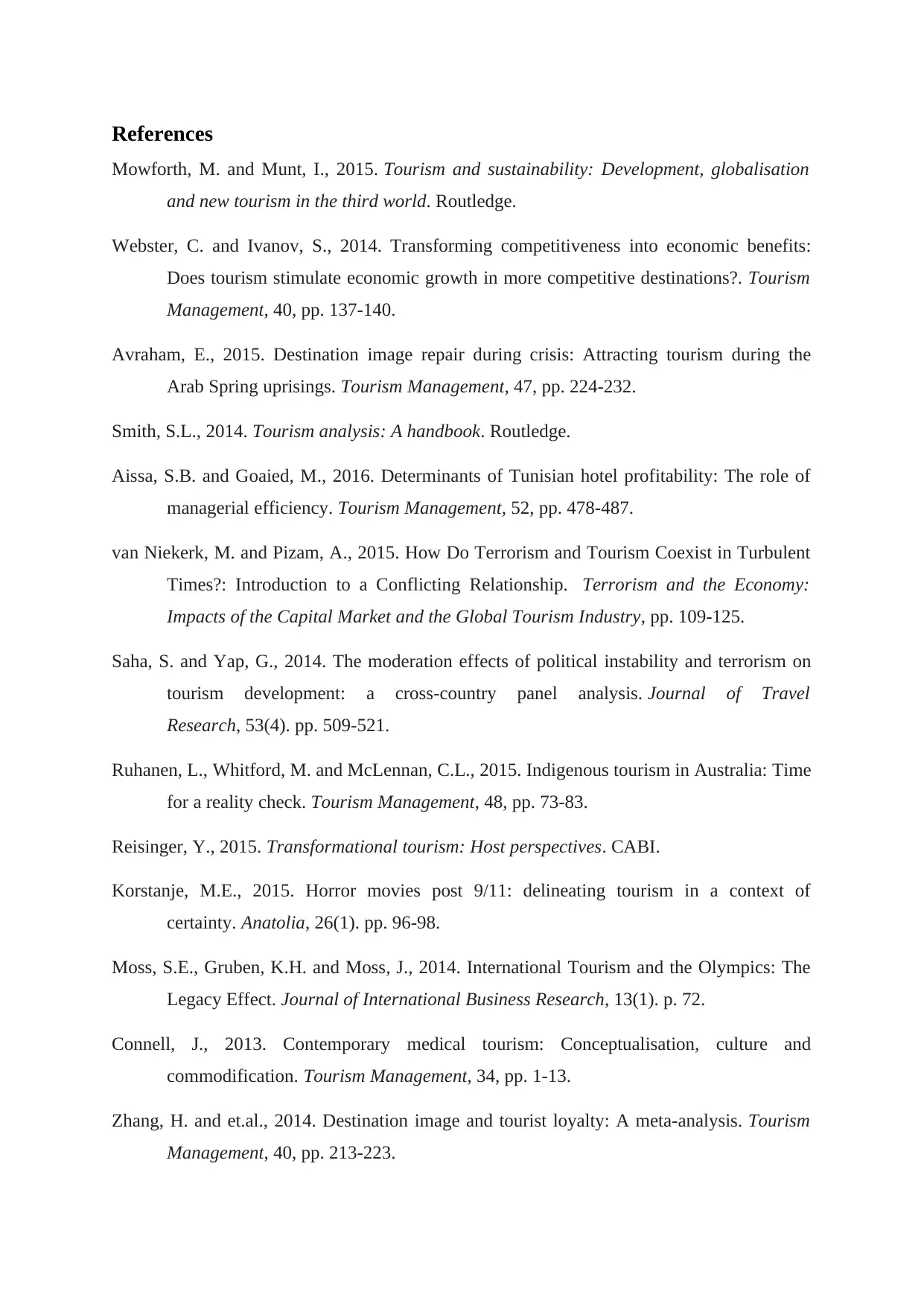
References
Mowforth, M. and Munt, I., 2015. Tourism and sustainability: Development, globalisation
and new tourism in the third world. Routledge.
Webster, C. and Ivanov, S., 2014. Transforming competitiveness into economic benefits:
Does tourism stimulate economic growth in more competitive destinations?. Tourism
Management, 40, pp. 137-140.
Avraham, E., 2015. Destination image repair during crisis: Attracting tourism during the
Arab Spring uprisings. Tourism Management, 47, pp. 224-232.
Smith, S.L., 2014. Tourism analysis: A handbook. Routledge.
Aissa, S.B. and Goaied, M., 2016. Determinants of Tunisian hotel profitability: The role of
managerial efficiency. Tourism Management, 52, pp. 478-487.
van Niekerk, M. and Pizam, A., 2015. How Do Terrorism and Tourism Coexist in Turbulent
Times?: Introduction to a Conflicting Relationship. Terrorism and the Economy:
Impacts of the Capital Market and the Global Tourism Industry, pp. 109-125.
Saha, S. and Yap, G., 2014. The moderation effects of political instability and terrorism on
tourism development: a cross-country panel analysis. Journal of Travel
Research, 53(4). pp. 509-521.
Ruhanen, L., Whitford, M. and McLennan, C.L., 2015. Indigenous tourism in Australia: Time
for a reality check. Tourism Management, 48, pp. 73-83.
Reisinger, Y., 2015. Transformational tourism: Host perspectives. CABI.
Korstanje, M.E., 2015. Horror movies post 9/11: delineating tourism in a context of
certainty. Anatolia, 26(1). pp. 96-98.
Moss, S.E., Gruben, K.H. and Moss, J., 2014. International Tourism and the Olympics: The
Legacy Effect. Journal of International Business Research, 13(1). p. 72.
Connell, J., 2013. Contemporary medical tourism: Conceptualisation, culture and
commodification. Tourism Management, 34, pp. 1-13.
Zhang, H. and et.al., 2014. Destination image and tourist loyalty: A meta-analysis. Tourism
Management, 40, pp. 213-223.
Mowforth, M. and Munt, I., 2015. Tourism and sustainability: Development, globalisation
and new tourism in the third world. Routledge.
Webster, C. and Ivanov, S., 2014. Transforming competitiveness into economic benefits:
Does tourism stimulate economic growth in more competitive destinations?. Tourism
Management, 40, pp. 137-140.
Avraham, E., 2015. Destination image repair during crisis: Attracting tourism during the
Arab Spring uprisings. Tourism Management, 47, pp. 224-232.
Smith, S.L., 2014. Tourism analysis: A handbook. Routledge.
Aissa, S.B. and Goaied, M., 2016. Determinants of Tunisian hotel profitability: The role of
managerial efficiency. Tourism Management, 52, pp. 478-487.
van Niekerk, M. and Pizam, A., 2015. How Do Terrorism and Tourism Coexist in Turbulent
Times?: Introduction to a Conflicting Relationship. Terrorism and the Economy:
Impacts of the Capital Market and the Global Tourism Industry, pp. 109-125.
Saha, S. and Yap, G., 2014. The moderation effects of political instability and terrorism on
tourism development: a cross-country panel analysis. Journal of Travel
Research, 53(4). pp. 509-521.
Ruhanen, L., Whitford, M. and McLennan, C.L., 2015. Indigenous tourism in Australia: Time
for a reality check. Tourism Management, 48, pp. 73-83.
Reisinger, Y., 2015. Transformational tourism: Host perspectives. CABI.
Korstanje, M.E., 2015. Horror movies post 9/11: delineating tourism in a context of
certainty. Anatolia, 26(1). pp. 96-98.
Moss, S.E., Gruben, K.H. and Moss, J., 2014. International Tourism and the Olympics: The
Legacy Effect. Journal of International Business Research, 13(1). p. 72.
Connell, J., 2013. Contemporary medical tourism: Conceptualisation, culture and
commodification. Tourism Management, 34, pp. 1-13.
Zhang, H. and et.al., 2014. Destination image and tourist loyalty: A meta-analysis. Tourism
Management, 40, pp. 213-223.
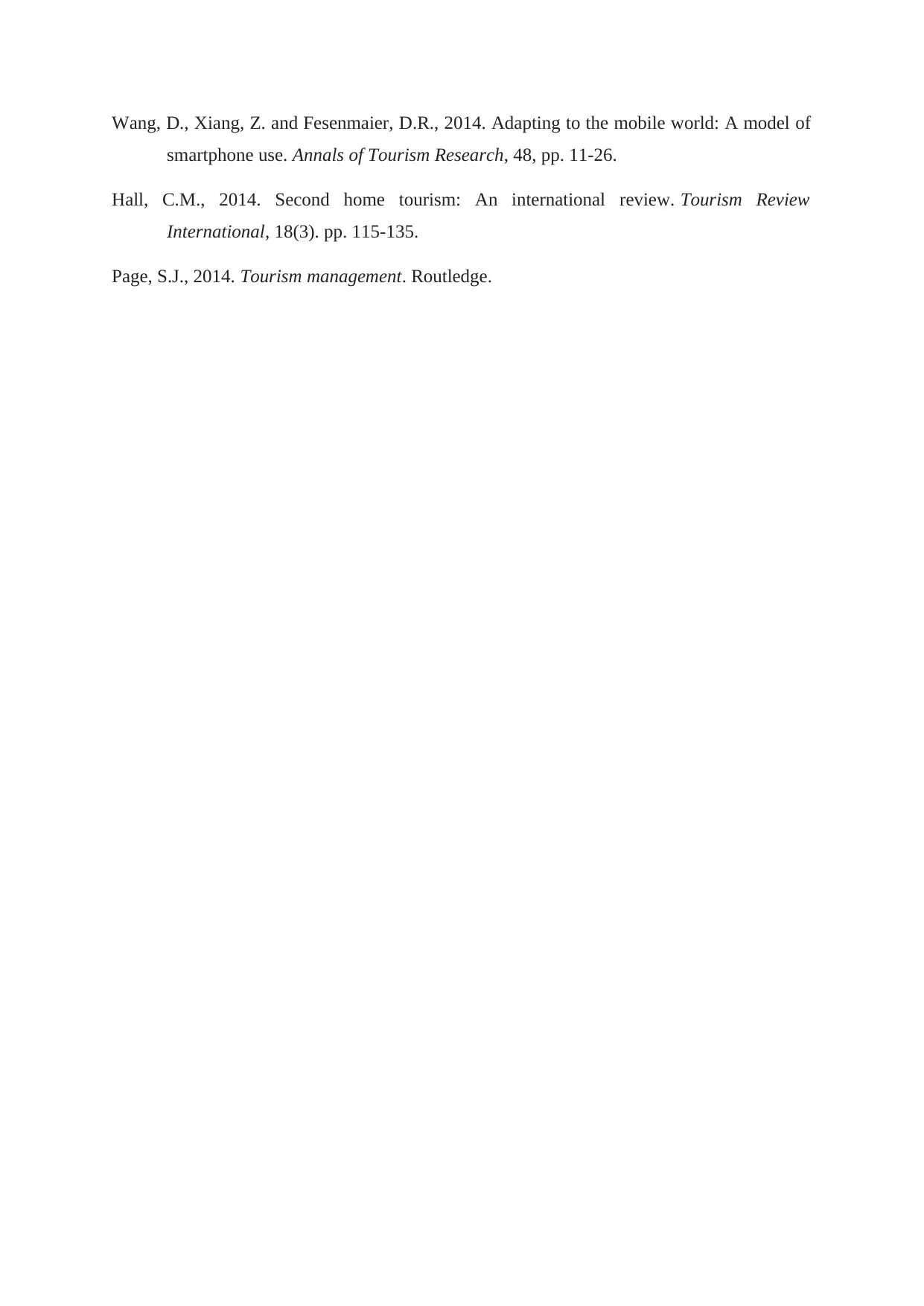
Wang, D., Xiang, Z. and Fesenmaier, D.R., 2014. Adapting to the mobile world: A model of
smartphone use. Annals of Tourism Research, 48, pp. 11-26.
Hall, C.M., 2014. Second home tourism: An international review. Tourism Review
International, 18(3). pp. 115-135.
Page, S.J., 2014. Tourism management. Routledge.
smartphone use. Annals of Tourism Research, 48, pp. 11-26.
Hall, C.M., 2014. Second home tourism: An international review. Tourism Review
International, 18(3). pp. 115-135.
Page, S.J., 2014. Tourism management. Routledge.
⊘ This is a preview!⊘
Do you want full access?
Subscribe today to unlock all pages.

Trusted by 1+ million students worldwide
1 out of 12
Related Documents
Your All-in-One AI-Powered Toolkit for Academic Success.
+13062052269
info@desklib.com
Available 24*7 on WhatsApp / Email
![[object Object]](/_next/static/media/star-bottom.7253800d.svg)
Unlock your academic potential
Copyright © 2020–2026 A2Z Services. All Rights Reserved. Developed and managed by ZUCOL.





